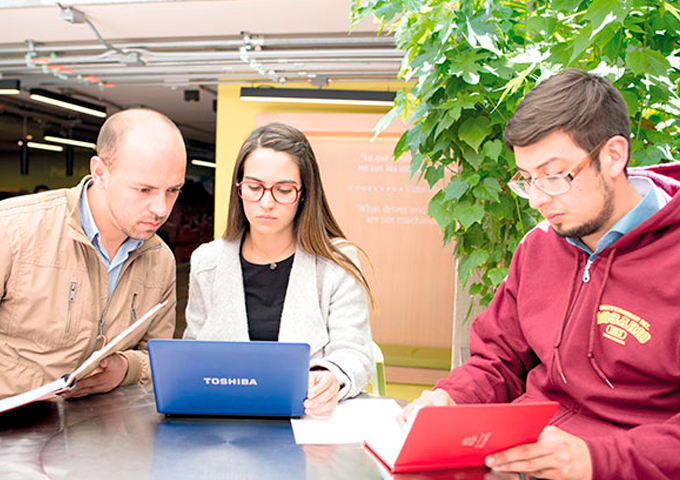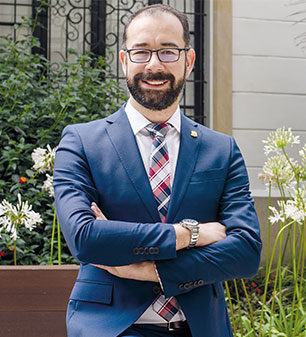“Science is not just for scientists”: Sergio Andrés Pulgarín Molina
By: Ángela Constanza Jerez
Photos:
Science and Tech

By: Ángela Constanza Jerez
Photos:
Although Sergio Andrés Pulgarín Molina supports institutional development from the vice-president’s Office of the Universidad del Rosario, his vocation as a professor remains valid. This is why he always expresses his ideas with pedagogical explanations and using examples that allow him to “put in words” the concept he wants to share.
In the last year, much of his pedagogy has focused on showing the educational community the importance of training scientific talent, and thus, building roads that support the mission of research and transformation in the university.
This is due to the purpose that the institution has had for more than two decades to consolidate, explore, and develop new research fronts to address relevant problems for humanity and, in particular, for the Colombian society. This means having a robust research ecosystem supported by the researchers and collaborators of the best quality
“At the Rosario, we believe that institutions have the capacity to train researchers in different ways,” explains the vice-president, referring to the university’s formative research and research training structure. This structure is supported by at least three pillars: the first one stems from the philosophical aspects of the Institutional Educational Project (Proyecto Educativo Institucional-PEI, as its Spanish acronym), in particular the one that explains how “at the Rosario, we do research to teach and we teach what we research,” which means that one of the distinctive aspects of the university is that its professors have the ability to navigate between two worlds: the worlds of teaching and research.
The second pillar converges in the Comprehensive Plan of Development-Ruta 2025, which guides the Rosario community toward the duty of conducting research of excellence with international recognition but having local relevance.
The third pillar is to consider that research is a capacity that is built and developed over time, and therefore, requires a fluid structure that allows it to progress, together with a cul - ture based on the cult of curiosity, respect for diversity in the work of science, and the acceptance of mistakes as the main form of the construction of knowledge.
“These are the three pillars by which we believe in building scientific talent through two dimensions: one is formative research and the other is training to research. In the area of training young people for research, the purpose is to prepare them to be researchers in the near future, and thereby, find a road for their long-term incorporation into our research ecosystem,” clarifies the vice-president.

Regarding the essence of the formative research, in the first stage, we seek to help students acquire a global understanding and, with the support of the teaching staff, to understand that “science is not exclusive to scientists; the scientist is not just a person in a white coat and glasses, who talks about theoretical things that are hard to process; and we do not expect all recent graduates to go out and practice science. We want our students to develop competencies based on the scientific method that apply to their working life, for example, the abilities to formulate and solve problems, to plan systematically, and to think critically,” says Pulgarín.
Achieving the development of these com - petencies in students is a challenge for profes - sors because the methodology they use will determine whether young people approach or withdraw from research. In the words of the vice-president, for this distancing to happen in today’s university, it is enough to pro - pose a course about research methods focused on contents and try to follow step-by-step the research principles of a book. Thus, “the goal of this course should not be to ‘inform’ stu - dents about the different methods for doing science; in contrast, it should be to ‘form’ re - search competencies. It is about encouraging students to learn to explore, understand, formulate, and intervene systematically using science and its methods as instruments,” he explains.
He also adds “I have seen some very interesting practices of our professors in this sense. For example, one of them begins his course on research methods by asking each student what their main hobbies are; on this basis, he asks them simple questions.
If the student’s hobby is mountain biking, the teacher asks, for example, what is the origin of this discipline; what types of mountain biking exist; how many and what types of bicycles exist; and how to improve the features of bicycles to make them more efficient? Thus, young people develop research skills while exploring, deepening, and proposing solutions in their fields of interest. In short, developing competencies for working life and technical and instrumental competencies is also based on research, which is what we call formative research,” he highlights.
The university is aware that reaching this point is not an easy task; an internal transformation is indispensable, which involves recognizing the importance of incorporating a pedagogical innovation in the teaching of research to transform classrooms into a scenario of active learning. Of course, this has had a lot to do with the classroom dynamics imposed by the pandemic, which has posed major challenges for teachers and students around the world.
“This year, we have been able to make progress on several initiatives,” comments the vice-president; “first, we have invested resources for deploying a road that we call teaching and learning for transformation, which aims to develop competencies in teachers to guide subjects mediated by technology, digitization, and digital life. Similarly, the institution has deployed the URLabs macroproject, which seeks to incorporate environments for experimentation, practice, and collaboration supported by the use of teaching labs.”
"I am proud to say that in 2021, we will inaugurate our 100th laboratory, even though we are not a university with a long tradition of training in engineering as we only launched ourSchool of Engineering, Science, and Technologyin the first quarter of 2021. We firmly believe that active learning is fos - tered through experience and experimentation, and this im - plies a phase of laboratory adaptation and training of our pro - fessors. If we do not train them, we will end up with educators teaching the same old class, but in a laboratory.”
Regarding the second stage, research training, the vice-president explains that the starting point is to assume that scientific talent is a scarce resource: “Not everyone is called to be a researcher, and we have to make a great effort to train talent in this area.
In this sense, Rosario has developed a set of paths to help find and train such limited scientific talent, which starts with the same experience of students with incubators.
“We know that a girl or boy who comes to an incubator does so because he or she has scientific curiosities. From incubators, we have developed a new figure to continue the research training path for our students; we call it ‘young research talent,’ which is also related to the figure of young researchers. The follow - ing levels, based on postgraduate training, belong to students who are in masters and PhD programs, where we also have figures to support the training of scientific talent,” Pulgarín points out.
According to the vice-president, maintaining these figures successfully is a great challenge for the university, as is consolidating the pedagogical innovation apparatus around the research training. This challenge has several stages; one of them is to strengthen the URLabs laboratory platform, which has an ambitious projection toward 2025, not only in infrastructure but also in teacher training so that they can train their students based on experimentation and experience.

“We want our students to develop abilities based on the scientific method that apply to their working life, for example, the abilities to formulate and solve problems, to plan systematically, and to think critically,” says Sergio Andrés Pulgarín Molina, vice-president.
Another challenge is the convergence of the digital world in the pedagogical practice of research teaching. “How do we teach how to do science using digital technologies and resources,” adds the vice-president. “To that end, we are making progress in a beautiful project with a MasterClass format (short vid - eos of master classes given by an expert of the highest level), which we are taking to the ‘researcher training’ stage. It is like putting together a Netflix series, with high-quality digital content production, to promote re - search teaching processes. A format similar to a miniseries that aims to train in a different way through the experience of great men and women in research, showing in a few minutes how research is done.”
Finally, the last challenge that the vice-pres - ident mentions, which he considers very chal - lenging, is to strengthen the coverage of the formative research model so that more stu - dents from Rosario develop a vocation for science, understand, and fall in love with sci - ence. “Today’s young people in general want to be entrepreneurs, media influencers, and lead large corporations, and only a few wish to be scientists. Therefore, the great challenge is to find mechanisms to captivate them and lead them along the path of training as researchers who will transform society and the world.”